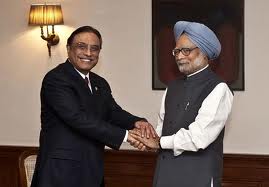
One of the more unheralded achievements of the PPP government has been the way it has repaired relations from the nadir of the 26/11 Mumbai attacks, when war seemed a very realistic possibility. Rather than try to be overly ambitious, the government has cautiously taken small steps towards lasting peace, with trade and regular high-level meetings inching the process forward.
President Asif Ali Zardari’s trip to the shrine of Sufi saint Khwaja Moinuddin Chisti in Ajmer, which allowed him to hold talks with Indian Prime Minister Dr Manmohan Singh, was yet another indicator that the two countries are moving firmly towards setting up a lasting peace between them. By all accounts the talks were cordial and Dr Singh accepted Zardari’s offer of a return visit to Pakistan. This was also the first time a Pakistani head of state had visited India since Musharraf in 2005, marking another landmark in the slow return to normalcy.
The two countries are fortunate that they both have leaders who are committed to the peace process but that does not mean that danger is not lurking around every corner. The army could easily scuttle whatever progress has been made by working around the elected government and embarking on yet another military adventure along the lines of the Kargil conflict.
In India, too, the hawks (of which significant sections of the media is a part) remains resolutely anti-Pakistan. Issues like Hafiz Saeed, who had a bounty placed on him by the US for actionable information leading to his conviction, are still unsolved. The two have so far decided to at least go ahead with lowering trade barriers with Pakistan set to grant India Most-Favoured Nation status by the end of the year. However, the rigid visa regime between the two, which makes it next to impossible for the citizens of either to visit, must be relaxed as well.
Also, as the recent landslide tragedy at Siachen has showed, both countries need to realise that perhaps the time has come to demilitarise the glacier.
Far more lives on either side have been lost to the ravages of weather than to actual combat and the cost of maintaining troops for both countries on the world’s highest battlefield should be enough to necessitate a final push for a bilateral drawdown.
